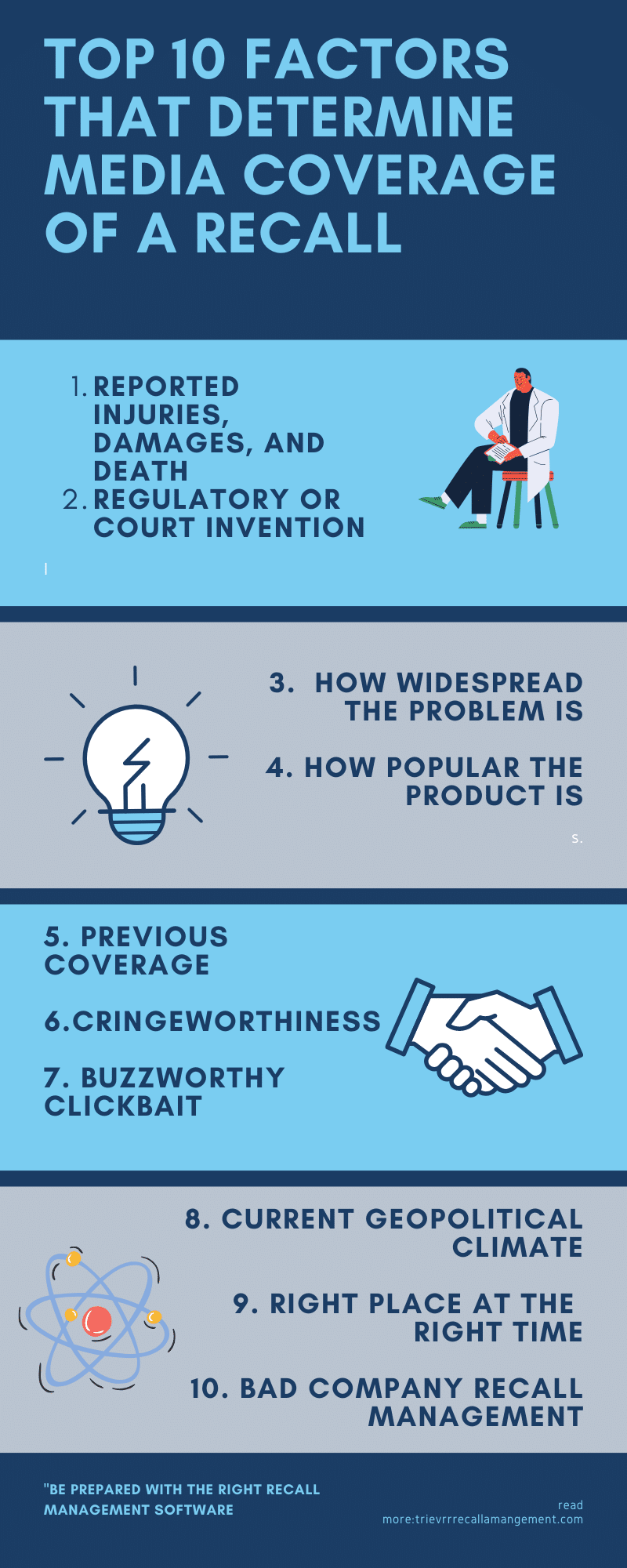They say all press is good press, but that doesn’t always appear true. Brands like Chipotle, Samsung, and Volkswagen all made nefarious headlines in the late 2010s for faulty products, and these PR disasters cost upwards of $33 billion in financial losses for each company. When performing a product recall, it’s tempting to avoid the media. Afterall, you don’t want your company to be known for making mistakes.
In reality, media coverage is quite beneficial during a recall process. Local and national press can help notify your customers and give your company an opportunity to get ahead of the story. However, not every product recall is newsworthy. Here’s what journalists are looking for in a story.
1. Reported Injuries, Damages, and Death
The Ford Pinto is an infamous automobile from the 1970s that serves as the mascot of bad engineering design. That’s because the company was forced to recall all models released from 1971 through 1976 due to a deadly flaw in its fuel tanks. When involved in a rear-impact collision, the gas tanks would explode, causing anywhere from 27-180 deaths. When compared to the 2.2 million Pintos sold, it wasn’t terrible, but the bad press gave Ford an image of low-quality products.
Deaths and other injury, illness, or serious property damage is a surefire way to garner the attention of journalists. Real people, pets, and property can be destroyed, causing product defects to go viral on either traditional or social media.
2. Regulatory or Court Intervention
Johnson & Johnson’s Extra-Strength Tylenol gained widespread media attention in 1982 when investigators started looking into reports of cyanide-laced products. They told the manufacturer to recommend consumers stop using Tylenol, as the capsules could have been tampered with. This involvement gained the attention of Chicago-area journalists who reported on the situation, keeping local citizens informed.
Any type of legal action – whether it involves the police, courts, legislative bodies, or regulatory agencies – will get the attention of journalists too. Many investigative reporters monitor these channels daily looking for stories.
3. How Widespread the Problem Is
Bottled water brand Perrier had a bottling machine contaminated with benzene during cleaning of a North Carolina plant in 1990. It was later found the substance naturally occurred in French springs, and the benzene simply wasn’t removed by filters. This led to over 160 million bottles being recalled around the world and soon gained the widespread attention of the global media.
Consumers soon filed a class action lawsuit against Perrier that opened a lane for competitors like Evian and Fiji to gain market share. It wasn’t long before the company folded and the brand was sold to Nestle.
4. How Popular the Product Is
Hasbro’s Easy-Bake Oven is an iconic children’s toy. Kids who want to practice their baking skills use a hot bulb to create miniature cakes, cookies, brownies, and other baked goodies. The brand also made headlines for two 2007 recalls of nearly one million Easy-Bake Ovens. Children reportedly got their hands stuck in the ovens’ openings, leading to several burns on young children.
5. Previous Coverage
Building on the Ford Pinto, the company has been involved in several recalls over the years. Most recently, 2.5 million cars are being recalled for door latch and brake troubles in 2020. Every Ford recall gains media attention, since the vehicles and company are so prominent, along with always being in the news. This makes them an easy target.
6. Cringeworthiness
Sometimes a recall involves such a gross scenario that it’s impossible not to cringe. For example, a Fresh Express salad in a Florida Walmart contained a dead bat. These types of gross outs are sure to make the rounds on social media and eventually be picked up by a mainstream media outlet.
7. Buzzworthy Clickbait
Death Wish Coffee was going for edgy with its branding. It didn’t help when the company had to recall its products after it was tied to botulism. Journalists and editors around the country reveled in the headlines about a product you would correctly need a death wish to enjoy.
8. The Current Geopolitical Climate
Sometimes a major event (like 9/11, COVID-19, etc) can overshadow product recalls in the newsfeeds. If it’s a slow news day, you’re likely to receive more media attention on your recall.
9. Right Place at the Right Time
Sometimes, all it takes to get a journalist’s attention is being at the right place at the right time. This could be because he/she lives near your headquarters, personally uses the product, or more.
10. Bad Company Recall Management
No matter what happens with the product itself, the recall process is more likely to draw media attention. If your recall process is disorganized, it causes delays and other mistakes. These mistakes are likely to catch the media’s attention, even if the initial recall didn’t.
Don’t let a recall ruin your business. Trievr’s on-demand recall management system can handle any size or number of recalls out the box. Contact a professional account executive to get started today.
